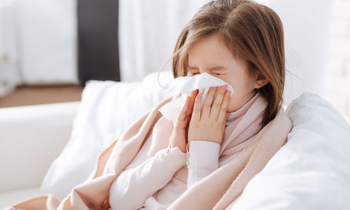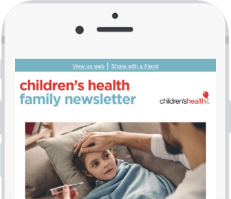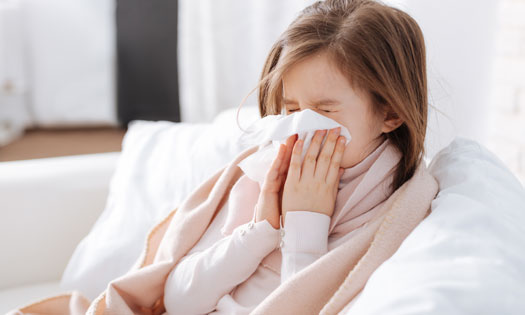Cold vs flu in children: How to tell the difference
Cold symptoms can be similar to flu symptoms in kids. Learn how to tell the difference between cold and flu.
As a parent, you can expect your kids to get colds every year, especially during the fall and winter months. So, how can you tell if your child is having flu symptoms or just has a cold?
Causes of cold and flu
Both the common cold and flu are caused by a viral infection.
- The common cold, also called an upper respiratory infection or URI, is caused by many types of viruses. You don't need any type of test to diagnose it.
- Flu is caused by specific influenza viruses and there are several strains that go around every year. With the flu, you can take a test to diagnose it.
Flu vs cold symptoms
The common cold and flu share some symptoms. These include:
- Congestion
- Cough
- Sore throat
- Runny nose
The symptoms of a common cold usually come on gradually. And then they get worse and can last 3-10 days. If your child has a cold, they may also have a fever. With flu, the symptoms usually come on more quickly and your child will look and feel sicker.
Symptoms of the flu in kids may include:
- Chills
- Cough
- Feeling tired
- Headaches
- High fever
- Muscle aches
- Nasal congestion
- Runny nose
- Sore throat
- Weakness
- Vomiting and diarrhea
Most kids who have the flu get better in a few days to 2 weeks. But it's important to see a doctor immediately, if your child:
- Has trouble breathing
- Has a change in skin color
- Is not able to drink fluids
- Has severe vomiting
- Appears very irritable
- Has a fever that goes away and then comes back again
See more tips to help determine when your child should go to the emergency room.
Cold vs flu treatment

If your child has a cold, you don't need to give them any specific medications. Believe it or not, cough and cold medications are not usually recommended for children.
It's important to keep your child well hydrated. If they're old enough, have them blow their nose as needed. If they're not old enough, you can suction their nose for them.
If you think your child has the flu, keep them home from school or daycare. Allow them to get plenty of rest and fluids. If they have a fever or pain, you can give them acetaminophen (Tylenol) or ibuprofen (Motrin) as needed. If your child has a chronic health condition, such as asthma or diabetes, or appears very ill, contact your pediatrician.
Tamiflu may help shorten the time your child is sick by 1-2 days - but only if taken within 48 hours of the onset of symptoms. Most of the time, children only need fluids and rest to improve.
How to prevent cold and flu
To prevent both the common cold and flu, teach kids to wash hands often and to cover their nose and mouth when they sneeze with their arm or sleeve. It's also important for you to help them avoid contact with sick people and to disinfect surfaces as much as possible.
The best way to prevent the flu is to get a flu vaccine. It's best for kids to get a flu vaccine every year before flu season starts so their bodies are prepared. This is because it takes about 2 weeks after the vaccine for them to make antibodies that help protect them from the flu. If you miss getting your children vaccinated in the fall, it's not too late. Getting a flu vaccine in the winter can still help protect them against the “second wave” of flu. For more flu prevention tips, see 6 ways to help your family stay healthy during flu season.
Learn more
Children's Health Primary Care offers comprehensive health care for children from birth through young adulthood. Our pediatricians combine quality care with evidence-based practice to meet your child's medical needs. Learn more and find a pediatrician.

Thank you!
You are now subscribed to the Children's Health Family Newsletter.
Children's Health will not sell, share or rent your information to third parties. Please read our privacy policy.
